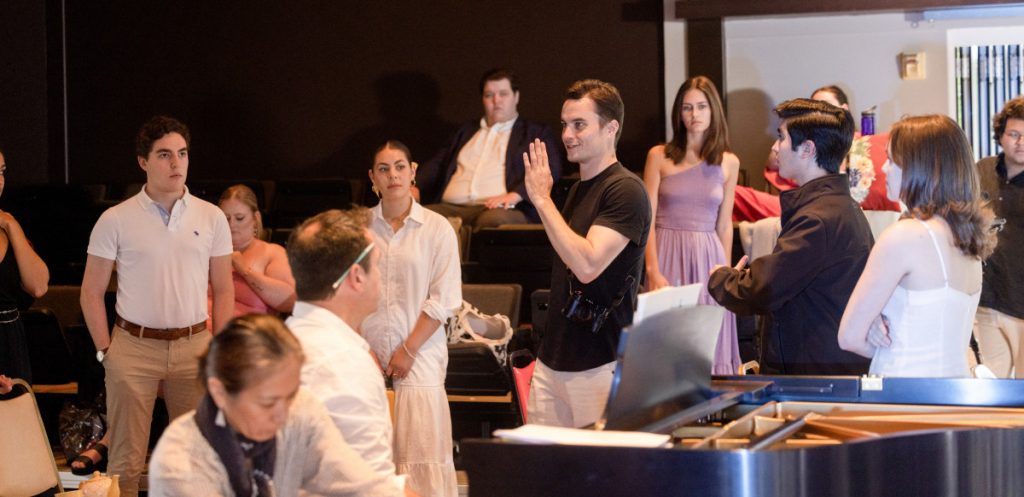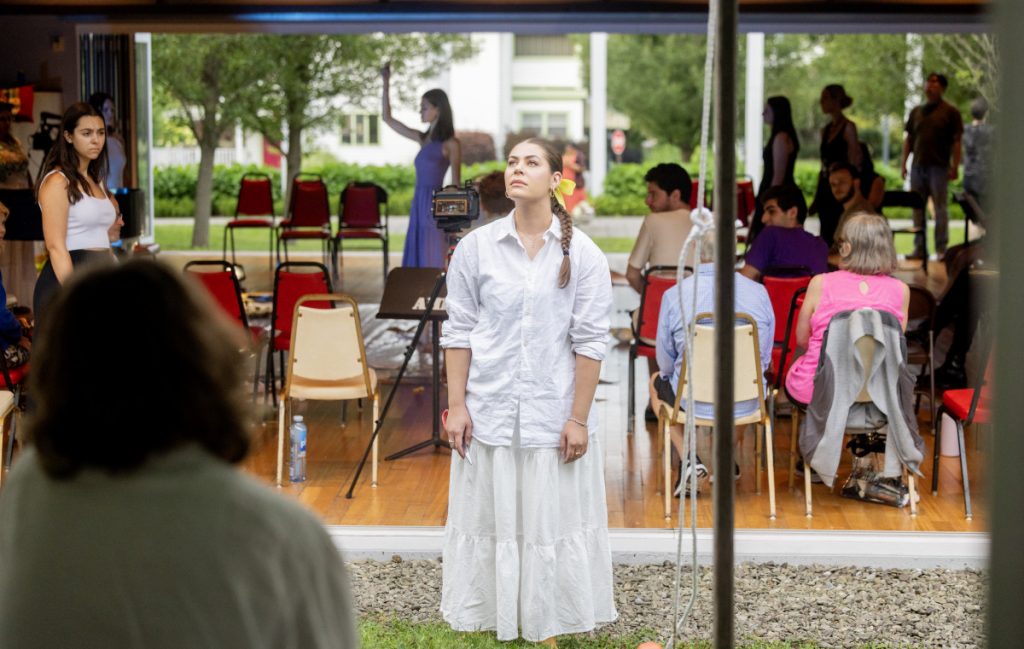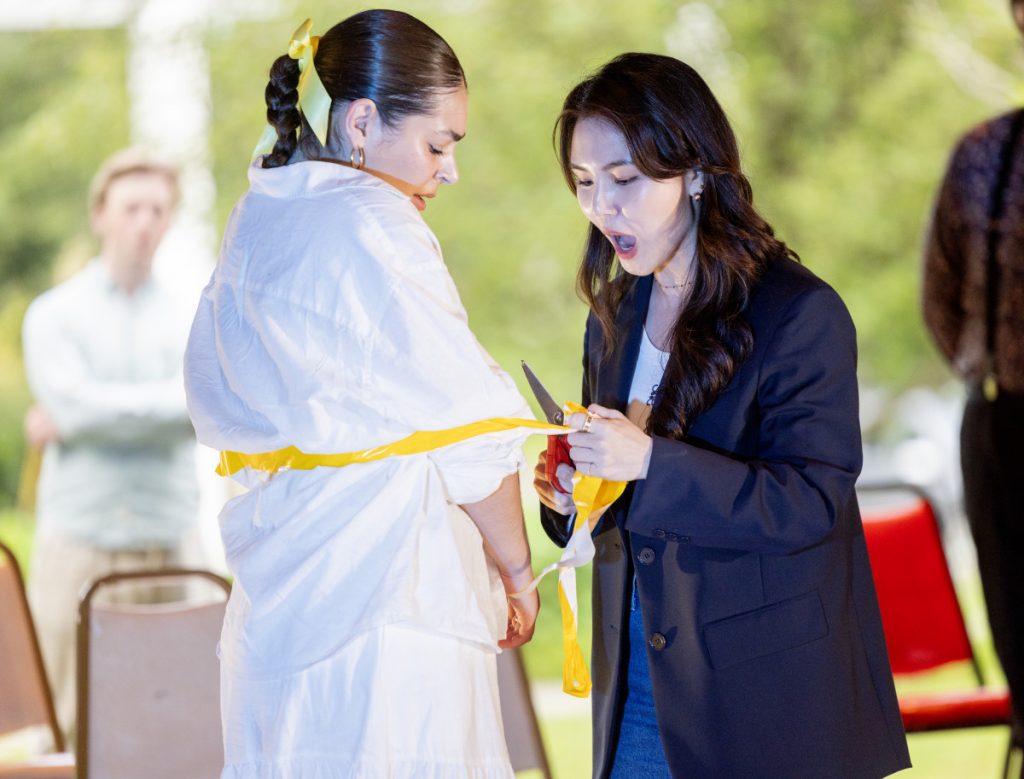
Zoe Kolenovsky
Staff writer
Under the direction of Marcus Shields, students of the Chautauqua Opera Conservatory will present Ravel and Colette’s L’Enfant et les Sortileges as the second of three major productions this season.
The first show is set to begin at 6:30 p.m. tonight in McKnight Hall, with a second performance to follow Wednesday. The whimsical opera will feature the acting and vocal talents of 28 students who have been preparing for weeks for their final staged performance of the summer.
Shields said he is taking a symbolic approach with the stage direction instead of an illustrative one, preferring for the music to speak for itself instead of relying on set and costume design to embellish the plot.
“What is in the music is so rich and detailed that (it’s) almost like the ideal experience of listening to opera – just close your eyes and let it activate your imagination,” he said. “That’s not to say the visual images aren’t important, but … they have to bring people into a mood or an atmosphere where they can sort of use all senses at once.”
That being said, the staging of the show incorporates many physical elements, with a very real tantrum scene at the beginning that involves destroying the entire set.
“We rip the entire space to shreds inches away from the audience,” said Shields. “It’s an immersive piece. … It’s less about you sitting back and watching it through a picture frame of a theater and more about us just being together in a room and figuring it all out together.”
The window-walls of McKnight Hall will also be removed in order to better ground the audience in the performance.
“It’s going to be really fun to have this inside-outside thing, different people and different distances from the hall itself,” said tenor Jackson Allen.
Written in 1925 by Maurice Ravel and Sidonie-Gabrielle Colette, the opera’s narrative centers on a naughty young child who is forced to face the consequences of his poor behavior when the objects in his room come to life to punish him.
“It has a sort of beautiful, zany, surreal quality to it,” said Shields.
Aside from L’Enfant and his mother, the rest of the cast is made up of inanimate objects from the child’s bedroom and animals from the garden outside.

“It’s a really bizarre show,” said Allen, who will be on stage as the “tree frog,” La Rainette. “But the music is so beautiful, and it’s really been a fun time.”
Aside from the wildly fantastical elements of the show’s plot, the story is actually one of transformative emotional growth, depicting a child’s first reckoning with responsibility and empathy.
“We teach this kid a lesson: How we all can feel something and you have to be respectful,” said Irene Shin, who will be playing the role of La Tasse Chinoise, the “china cup” or teacup.
Shin said at first the characters are angry at L’Enfant and want him to suffer for the way he treated them. However, ultimately they still felt love and affection for the child despite his violent behavior.
Bass-baritone YeongTaek Yang plays L’Horloge Comtoise, the “grandfather clock,” and he describes his scene confronting L’Enfant after being broken; the scene ends with the child embracing the clock.
“It seems very strange, but (I) could feel how … the clock still likes interacting with L’Enfant and then how he loves L’Enfant,” he said.
The child doesn’t seem to truly have a change of heart until near the end of the show, where L’Ecureuil, “the squirrel,” becomes injured and L’Enfant tends to her.
“If you view it as an act of forgiveness, which is how I do, you see that the squirrel is really connected to L’Enfant and the story is one of empathy and kindness and this beautiful arc,” said mezzo Matilda Smolij, who will play the squirrel.
This arc of L’Enfant’s character development is what excites Shields the most about producing this show, as he views it as a metaphor for the students’ development.
“L’Enfant is, to me, a piece about … realization and activation and transition, going from one stage of your life to another,” he said. “It’s about the reality that there’s no moment when you go from being a child to being an adult.”

Shin said this journey of self-discovery will be familiar, yet universal.
“We all know what that is, to be somebody’s kid,” she said. “I think it really comforts everyone’s childhood, and I think we staged it beautifully.”
The process of preparing L’Enfant over the past two weeks has embodied this concept of personal growth for Shields and his students.
“From the minute you start, to the minute you end, there’s this thing you go through which is filled with self-doubt and challenge and thinking you can’t do it … and being tired and being fatigued and dealing with life,” he said. “By the end, you get somewhere very special because you’ve gone through a lot to get there.”
He continued: “We’re always in this sort of process of being challenged by something and overcoming it, which is what I think this piece is about and what the summer is about and what life is about.”
Reflecting on her time at Chautauqua this summer, Smolij agreed that producing L’Enfant helped her re-evaluate her goals and discover a truer sense of purpose.
“It’s really about the joy of singing and enjoying the experience,” she said. “It’s a reminder of why we do what we do.”




